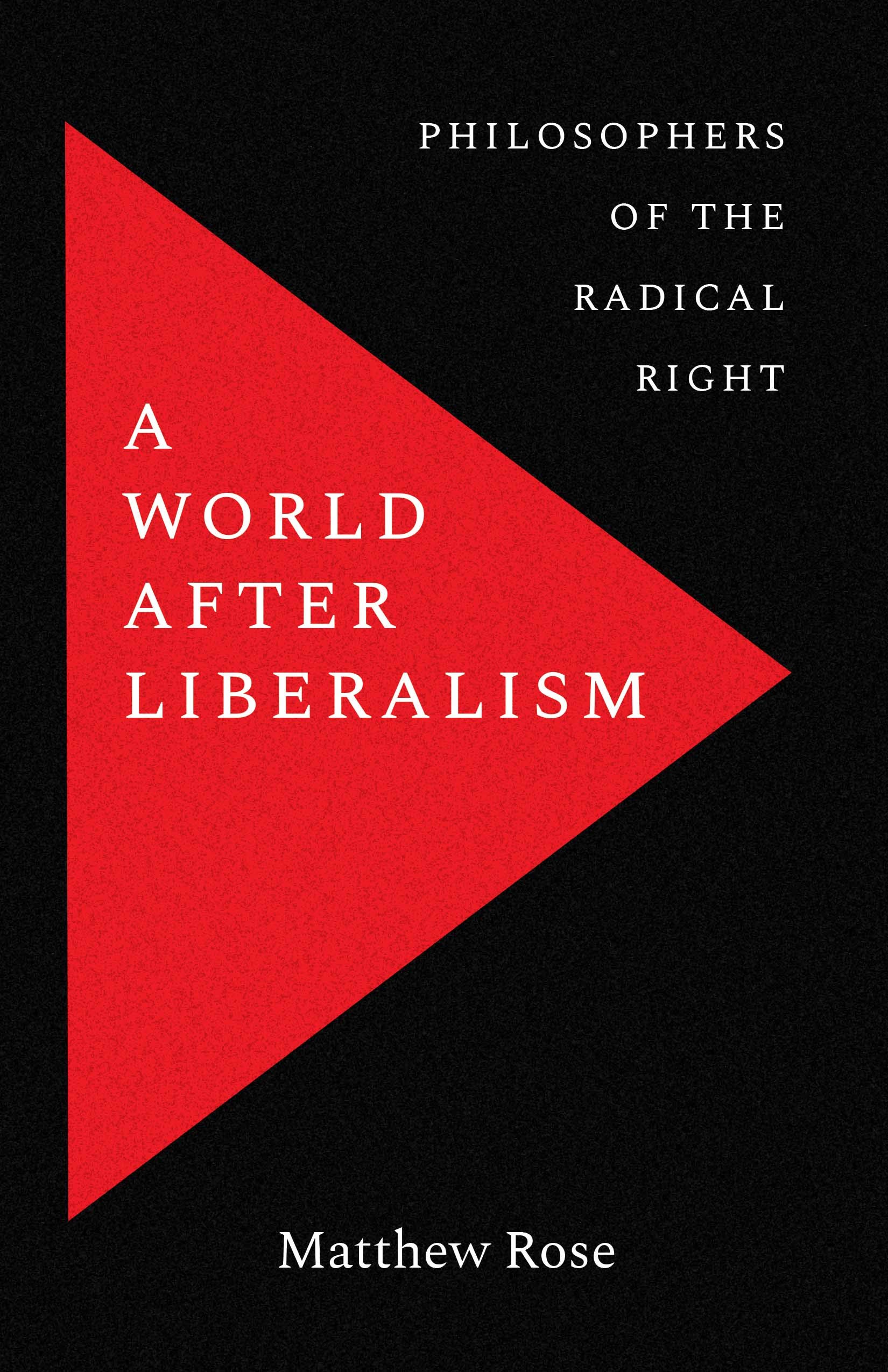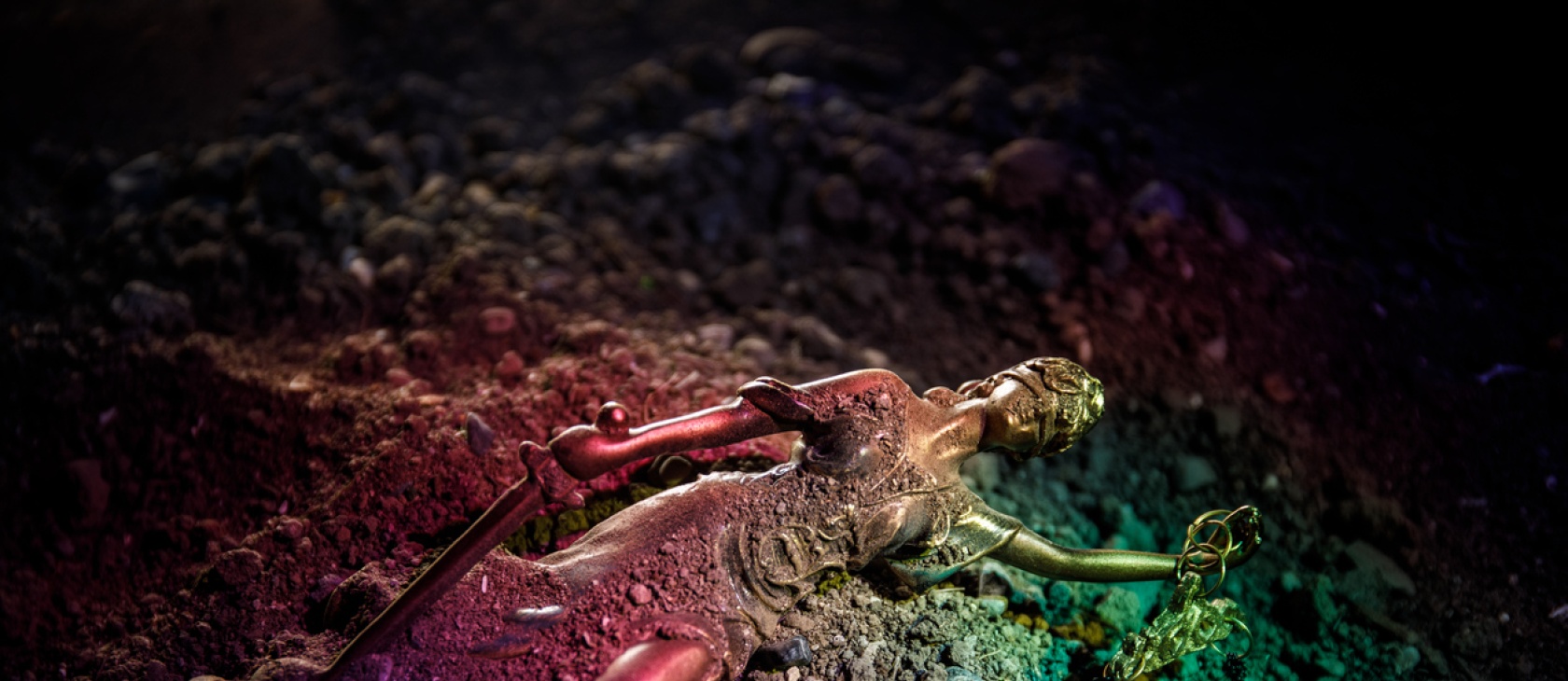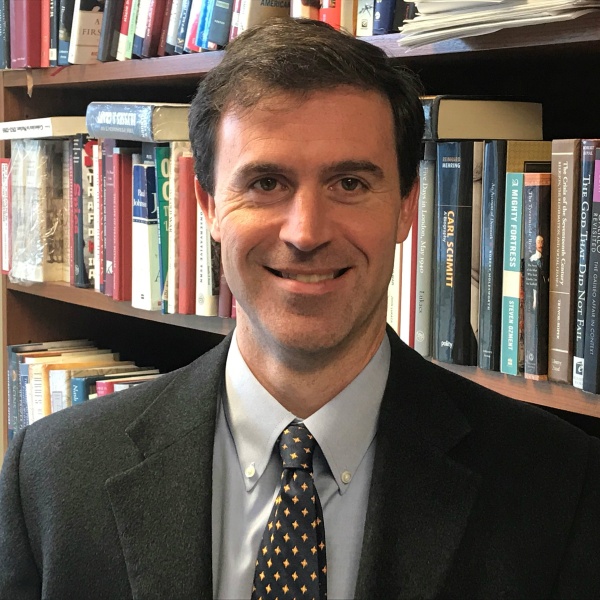In the introduction to A World After Liberalism, Matthew Rose observes that the most provocative thinkers on the right now contest liberalism, individualism, and autonomy. He argues: “We are living in a postliberal moment. After three decades of dominance, liberalism is losing its hold on Western minds. Its most serious challenge does not come from regimes in China, Russia, or Central Europe, whose leaders declare that the liberal epoch is ‘at an end.’ It comes from within Western democracies themselves.” Of course, the greatest challenge to liberalism in America does not currently emanate from the right, but from the identity politics of the left.
A new survey of five radical right thinkers aims at understanding what may be motivating post-liberal thinkers today. Both old and new right, however, suffer from a similar failing: the tendency to become everything they say they hate.

By Matthew Rose
(Yale, 2021)
There are, however, unmistakable voices on the right who reject or critique America’s constitutional order and the principles that undergird it. In general terms, their economics are left leaning, their cultural objectives are right, and they favor an expansive use of state power for social and moral purposes. They dismiss conservatism’s usual concerns with the problems inherent in the use of state power for such reasons. Their rise seemingly presents the occasion for Rose’s book, which profiles five 20th-century post-liberal thinkers in Europe and America: Oswald Spengler, Julius Evola, Francis Yockey, Alain de Benoist, and Samuel Francis. The author presents their arguments and beliefs in all their shocking, cringe-inducing form. Rose’s book provides the full contents of a radical post-liberal imagination, a valuable service if we are to refute and prevent it from recruiting new adherents.
General trends in the profiled thinkers emerge despite their many differences. These thinkers decisively reject Christianity because they view it as a cultural dissolving force. Why? Christianity worships a transcendent God who loves each person equally. Indeed, Christianity’s claim that God incarnated himself as man in order to redeem man from his own sin through the God-man’s death and resurrection is the ultimate ground of human equality under law. We should not, therefore, be surprised that Christianity is first on the chopping block for these right-wing, post-liberal thinkers. Liberalism in its best sense is built on this Christian embodiment of equality, and “radical right” thinkers argue that such equality is a lie.
The radical-right thinkers argue that “liberalism was evil.” Liberalism “destroys the foundation of social order. It obscures the central moral distinction, which is not between right and wrong, but between civilization and barbarism.” Therefore, liberalism’s politics and conception of law aim at neutrality and openness, deferring to answer the questions of how people should live according to religion or sacrificial duty. By denying people comprehensive answers to basic questions about virtue and excellence, liberalism leaves people with the inability to lead lives of greatness. It further denudes a civilization of its inheritance, its full scale of identity. For an understanding of the seduction of unchosen identity, we should explore Oswald Spengler.
The first volume of Spengler’s The Decline of the West (1918) encapsulates many of the themes the other thinkers profiled in the book will exhibit. Spengler, Rose observes, sets forward that “the human world is the world of culture.” By this Spengler means something vastly more than that the human person cannot be understood by modern scientific analysis. Spengler argues that “languages, rituals, histories, myth, works of art and music” are not just things we do, but “they are that by which we know.” Our nature as a person is such that we cannot immediately understand reality with reason, observation, and logical argument. We can only do this through the culture we were born into.
Spengler radically separates human beings into culture and denies that our cultural identity could even be a matter of choice. In the attempt to locate the essential activity of the person in cultural artifacts, Spengler becomes the deterministic thinker par excellence. He is also an early prophet of multiculturalism. How could he not be? If human beings are incapable of rising above their culture and are locked in a self-contained world, then cultures are, of course, radically separate and inaccessible to outsiders. And, as Rose notes, “if cultures are incommensurably different, so too are human beings.” Spengler’s denial of universal categories that reason might understand and reflect upon becomes a gaping hole in how human beings might talk to one another across civilizations. And this radical disjunction extends even to the sciences. Spengler at one turn argues, “There is not one sculpture, one painting, one mathematics, one physics, but many, each in its deepest essence different from the others.”
One thing all cultures share under Spengler’s analysis is that they are fated to die over a life cycle. If each culture is animated by a central or prime symbol within a sealed atmosphere, then gradually its life-giving form will begin to wane. Nothing is eternal. Crucially, Spengler makes two interesting moves in distinguishing Western culture’s uniqueness amid the rather equivocal standing it should have given his cultural relativism. The West is “Faustian,” that is, it strives for “infinity.” The prime symbol of Faustian man is a constant seeking, a desire “to surpass and extend” one’s discoveries beyond each frontier. Secondly, Christianity did not shape Western civilization; rather, Christianity was shaped by the Faustian strength of Western man. Spengler, no Christian, sought to incorporate Christian spirituality into the cultural symbol of the West while demoting its truth claims about God and man. This commentary on Christianity, Rose adds, fully emerges in the second volume of The Decline of the West (1922), where Spengler notes that Christianity also contributes to liberal political ideals and human equality. And more is the pity, because liberalism, according to Spengler, “detests every kind of greatness, everything that towers, rules, is superior.” Spengler called on what he thought was the pure witness of Christ who cared only for the eternal world, without thought for justice here below. Christianity was an achievement of the West and was its deepest weakness.
For a cure to this Christian ailment of making equality a fundamental touchstone of political order, Julius Evola evoked a utopian world of Tradition as a sempiternal fund of truth about the human person, society, and cult, which builds order on inequality, aristocracy, and sacred obligations. Tried in Rome in 1951 for promoting the restoration of the dissolved Fascist Party, Evola pled an academic detachment, with his involvement taking place on a “purely intellectual and doctrinal level.” He merely called for “fascist ideas, not inasmuch as they are ‘fascist,’ but in the measure that they revive ideas superior and anterior to fascism.” Those ideas that Evola perversely thought could serve as a bridge were mythic, prehistorical notions of the true ways by which all human societies found order and harmony.
Evola’s testimony to Tradition evokes his spiritual disorientation in liberal society and his deep imaginative capacity to find an alternative order. His master was the so-called Descartes of esotericism, René Guénon, a convert to Islam, who decamped from Paris to Cairo in the 1930s for “a more traditional society.” Guénon sought the underlying principles shared by the great spiritual masters. He further argued that modernity marked the severing of the West from transcendence, thrusting it into a spiritual dark age. Evola took this insight and deepens it in his book Revolt Against the Modern World (1934), where he argues that modernity’s evident chaos follows its severed relationship with transcendent order. This collapse in modernity was caused by “desacralization” and the separation of daily life from true spiritual order.
Tradition is needed, but it can be accessed only through “myth, legend, and esoteric readings of premodern texts.” But the esotericism is no impediment, because Tradition’s truths are simple: “Every aspect of human life, every social activity, role, and caste, is dedicated to the service of a higher order.” They became the way prehistorical man reached “transcendence.” And, Evola thinks, these pathways to the eternal verities remain open to modern man, despite his desiccated condition. In the Traditional world, he intones, “nature was not thought about but lived as though it were a great, sacred, animated body, the visible expression of the invisible.”
Evola’s fantasies were intoxicating to many on the far right. His disdain for liberal society was manifest in his calling for a “Real Right” to take charge of society in a revolution from above and to rebuild a higher, elevated, aristocratic society. In this, Evola would remain disappointed. Christianity’s crimes were legion in his eyes. Evola’s Tradition called for political authority to be holy, sacral, absolute. But Christianity had made this nearly impossible by locating the highest truth for man in a transcendent God. This limited political power and encouraged skepticism, if not rebelliousness, toward authority, per Evola. There was also the egalitarianism of Christianity, which eroded hierarchies of the spirit needed for a traditional society to flourish.
In the end, Evola’s dreamlike politics left him deeply unsatisfied. He began to conjure violent notions in light of the New Left’s turn against bourgeois society. Perhaps the negation of the negation was something to be wished for if Tradition was going to reemerge. As Rose notes, he offers a comprehensive vision of an anti-liberal society to those who find themselves spiritually dispossessed. And all of it is scarcely believable, but it remains an outline of the form that the neopagan right could take in our age against the constant assertions of identity politics.
The chapter on the American thinker Francis Parker Yockey touches on an anti-Semitic, fascist, and anti-American ideologue who remains quietly influential on the far right. Yockey’s interpretation of postwar events in Imperium, his 1950 book that launched him on the far right as a touchstone thinker, was bizarre at the time. But Rose argues it is maybe not so extraordinary in our own period. Themes in the book include his clothing of political power in hierarchic and absolute terms, his analysis of cultural Marxism, his appeal to Russia as a new hope for civilizational order, and his belief that the purpose and cultural vitality of the West was in global domination. He further argued that contemporary Western leadership was impotent and complicit in emptying out the form and substance of Western culture. Its crime was that it protected the enemy within, whose critical ideas were undermining the West.
Yockey was, as notes Rose, a “virulent antisemite.” His analysis of “cultural Marxism” included Marx and Freud and other thinkers who argued that ideas, habits, and institutions in Western life were not built on truth or the stated reasons but on nefarious interests and irrational instincts. Cultural forms could not be trusted on appearance but should be the subject of suspicion—this was the danger the West faced from Jews.
Yockey’s truly demented anti-Jewish mind can be seen in his analysis of the Soviet Union’s hanging of 11 members of the Czechoslovakia Communist Party, including the general secretary, in 1952. For Yockey it signaled that the Soviets were expelling the Jewish intrusion from their leadership and that Russian nationalists had taken control of the Russian state. Consequently, the Soviet Union was no longer an ideological threat to the United States. Rose argues that this is the first instance of the radical right seeing Russia as a cultural ally that will reinforce its position in the West. In the end, Yockey was captured by the U.S. government in 1960 after having worked and conspired with enemy communist governments. Rather than face interrogation and imprisonment, he killed himself with cyanide capsules. Rose ends the chapter by noting that he lived in service to his ideas and sacrificed greatly for them. We may find those ideas horrible, but Rose nevertheless notes that he lived his life in service to them. Many Communists and Nazis lived existences of sacrifice and death, too. And we should remember none of them.
Alain de Benoist is a contemporary French thinker whose ideas have resonance within Europe’s roiling debates about immigration, national identity, cultural integrity, and the future of the continent amid ongoing challenges from liberal ideology in its worst sense. The liberalism of the European Union elite does not recognize the need for borders, nations, the Christian religion, and the family. Its highest values are the autonomous individual on the one hand and humanity at large on the other. From these two it derives a politics of cosmopolitanism oblivious to the deep culture and history of the European continent. Benoist seems to offer nothing new in the series of thinkers profiled by Rose, but he has cleverly pilloried modern liberalism for these follies. His critique of Christianity is that it elevates individuals above their culture, their family, and their group, making them unique individuals before God. And nothing could be more detrimental to culture than that. His conception of culture and nation as formative of identity seems regnant for a far-right thinker. Benoist defends democracy as a preeminent Western political form, but he decries liberal democracy as a perversion of the form because it is an oxymoron that places universal aspirations for human beings alongside what should be largely closed societies.
Benoist’s most controversial idea sounds like that of Nazi legal theorist Carl Schmitt. Cultures depend on belonging, and they must have an “other” who is excluded from their primal form. This is not necessarily friend versus enemy, according to Benoist, but builds on the idea that “we are what we are, the way we are, depending on what we are not and the way we are not.” Dialogue and exchange can happen provided the other remains fundamentally the other and the twain never meet. Benoist failed to notice that, in proposing fundamental and universal rules of self-enclosed culture as true for every human group, he contradicted his own theory of the separateness of cultures. Benoist: cultural imperialist.
Samuel Francis is the last radical rightist that Rose illuminates, and he traffics in much of the thinking that the previous four men exhibited. However, Francis was an adviser to Patrick Buchanan in his two presidential campaigns. He articulated certain aspects of politics that conservatives in America in the post–Cold War period overlooked, like the interests and sentiments of middle Americans, working class in economic orientation and generally conservative in culture while not overly religious. This configuration obviously emerged in Donald Trump’s 2016 presidential campaign. Rose notes that Rush Limbaugh read an unsigned 5,000-word essay, written by Francis, to his audience, concluding that the essay was politically brilliant.
Francis built his political thought on a class-dominated understanding of politics garnered from James Burnham, although Burnham was not as mechanical in his own analysis. He concluded that American conservatism in its dominant form was deluded because it appealed to the constitutional order and an undergirding intellectual form for the vindication of the America it wanted to rebuild. Francis replied that it was in no one’s economic interests to rebuild that America, and so it was a fool’s errand. But can the human person and politics be reduced to class and race, even in service of a more “conservative” America? Francis thought so, and his appeal to culture was ultimately an appeal to white Americans to repel the cultural destruction project of liberalism. Why only whites? He responded that every culture depends on a dominant racial class for its leadership. America was no different. Francis explicitly set power against power with no real belief in an American citizenship that turned on freedom and equality. Francis would likely be the only “conservative” in America to deplore that Latino voters are increasingly becoming Republican and undoing the vaunted “Emerging Democratic Majority Thesis,” which argued that a shrinking white America would lead to Democratic Party dominance.
Francis also turned his fire on Christians. They were the “religious wrong” who failed to understand that Christian insights about the human person were a form of false consciousness, preventing these people from understanding how to recover American greatness. Such recovery did not depend on faith, natural law, constitutionalism, economic liberty, and rule of law, but on power and force from Middle American Radicals who would defend America as a unified political-cultural product requiring economic nationalism and traditional moral codes for its supports.
Samuel Francis, Rose notes, in a powerful rebuttal came to resemble his critics: “He deluded himself into believing that he was an enemy of leviathan and a friend to its culture, when he was in fact neither. Francis could not see how thoroughly he shared the philosophical assumptions of liberalism. Its denial of transcendence, its rejection of natural law, its anthropological materialism, its skepticism about reason, and its reductive psychology—Francis accepted every one of its doctrines.” In the end, Francis let himself be led by class, economics, and race to come to political conclusions that seem conservative but ultimately reduce the constitutional order to something less than freedom and virtue. As this volume attests, he was not alone in these gravely mistaken judgments.




